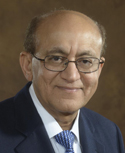Meet the Honorary Degree Recipients
These seven are innovators in their fields of music, science and education
In addition to the 5,100 Duke students receiving diplomas Sunday at commencement, honorary degrees will be handed out to seven individuals who have already changed the world in extensive ways.
The recipients come from the worlds of music, education and science. They were selected by a committee of faculty members and university trustees (this link does not work) not just in recognition of their accomplishments, but to reaffirm Duke's own values and commitment to excellence. Commencement speaker Paul Farmer is not eligible to receive an honorary degree because he is a member of the Duke Board of Trustees.
Here are this year's recipients:
France Córdova, Doctor of Science
After a career as one of the world's leading astrophysicist, Córdova is now the 14th director of the National Science Foundation (NSF).
Córdova leads the only government science agency charged with advancing discovery, innovation, education and training in the fields of science, technology, engineering and mathematics (STEM). She is the first woman and the first person of Hispanic descent to hold this role.
Her research has been in the areas of observational and experimental astrophysics, multi-spectral research on X-ray and gamma ray sources, and space-borne instrumentation.
Renee Fleming, Doctor of Arts
Called “a superstar by any measure” by the New York Times, Fleming is the most celebrated opera singer of our time. She has a full lyric soprano voice that shines through a wide variety of works, including Baroque opera, Mozart, the Italian bel canto repertoire, Verdi, Massenet, Puccini, Richard Strauss, contemporary operas, jazz and songs from all eras.
A musical ambassador, Fleming has performed at distinguished occasions around the world, including the 2006 Nobel Peace Prize ceremony, the 2008 Olympic Games in Beijing, and President Obama’s inaugural celebration in 2009.
In 2012, she sang on the balcony of Buckingham Palace in the Diamond Jubilee Concert for Queen Elizabeth, and in 2014 she became the first classical artist to sing the “National Anthem” at the Super Bowl.

Rakesh Jain, Doctor of Science
A pioneer in tumor biology, Jain is using physics to fight cancer. He introduced the idea that a solid tumor is not simply a collection of cancer cells but an organ-like structure. He proposed the groundbreaking hypothesis — and then validated it in mice and cancer patients — that “normalizing” the tumor microenvironment can improve the treatment outcome.
Jain’s discoveries have led to clinical trials that have had a major impact in improving therapies for the treatment of many forms of cancer.
The recipient of more than 50 awards, Jain is the Andrew W. Cook Professor of Tumor Biology in the Department of Radiation Oncology at Harvard Medical School.
Jain discusses his cancer research with Scientific American here.
David Levin and Michael Feinberg, Doctor of Humane Letters
Feinberg and Levin met in 1992 while they were both teaching fifth grade in inner-city public schools in Houston as part of Teach For America. In 1994, they started their own free, open-enrollment middle school in Houston with just 50 students and called it KIPP -- the Knowledge Is Power Program. A year later, Levin established KIPP Academy New York in the South Bronx.
Today, KIPP is a national network of 141 high-performing public schools in 20 states and the District of Columbia, serving 50,000 students – 86 percent of whom come from low-income families and 95 percent of whom are black or Hispanic. To date, more than 90 percent of KIPP middle schoolers have graduated from high school and more than 80 percent have gone on to college.
Harold “Hal” Mooney, Doctor of Science
At a time when scientists are building consensus on how climate change is altering ecosystems, Mooney's expertise has been crucial to that process. One of the few scientists to be selected for the National Academy of Sciences, the American Academy of Arts and Sciences, the British Ecological Society and the Russian Academy of Sciences, Mooney's research on ecosystems stretches from the tropics to the Arctic.
The Paul S. Achilles Professor of Environmental Biology at Stanford University, Mooney has analyzed the impacts of global change on terrestrial ecosystems, especially biodiversity and the invasion of non-indigenous plant species.
He received his Ph.D. in biology from Duke in 1960 after studying with Dwight Billings, considered the father of physiological plant ecology in the United States.
McCoy Tyner, Doctor of Arts
For those many music fans who consider John Coltrane's "A Love Supreme" to be the bible of jazz, Tyner's piano playing leaves an indelible memory. The two musicians were both Philadelphians with small-town North Carolina roots: Coltrane, the older of the two, was born in Hamlet and raised in High Point; Tyner's parents were raised in Murfreesboro in Hertford County. Together they changed the direction of jazz music.
Since that pairing, Tyner has gone on to a successful solo career that includes five Grammy Awards. His artistry and versatility have enabled him to embrace a multitude of styles, from African and Latin rhythms to the modal harmonies of the post-bebop era. An inventive composer, Tyner has been a major influence on the adoption of quartal and quintal harmonies, modes and pentatonic scales in jazz music.